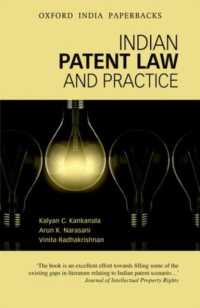- ホーム
- > 洋書
- > 英文書
- > Politics / International Relations
Full Description
Since partisanship has become a powerful force in the U.S., academic literature is replete with different approaches to this complex, multifaceted topic. Reconsidering Parties and Partisanship brings together prominent scholars working on issues related to parties and partisanship for a collection of essays on how American partisanship is shifting and changing in the 21st century. This volume pushes readers to re-evaluate their understanding of the role of parties and partisanship in contemporary politics and offers a helpful set of analyses and tools for understanding the key features of the partisan environment in which the nation finds itself.
The scholars here approach parties from the standpoint of partisan and social identities, polarization, the prevalence of independents (and pseudo-independents), political campaigns, and more. In linking the different faces or levels—party-in-the-electorate, party-in-government, and party-as-an-organization—the chapters provide a wide-ranging set of theories and ideas to consider. Through this exploration, Reconsidering Parties and Partisanship provides a valuable road map for partisanship in our current era.
Readers will learn
How conditional party government seems to work in this highly partisan era
How donors and pressure groups have taken ownership over campaigns
How independents are often undercover partisans, but who also feel repelled by the existing parties—even the one they typically support
How various identities converge to produce partisan affection (when that exists)
How partisanship relates to ideology.
Contents
List of Figures
List of Tables
1 Introduction
1. "Parties and Partisanship Reconsidered" (Christopher F. Karpowitz and Jeremy C. Pope)
2 From Identity to Polarization
2. Section Introduction: "From Identity to Polarization" (Christopher F. Karpowitz and Jeremy C. Pope)
3. "Worldview and Partisanship" (Marc J. Hetherington, Andrew M. Engelhardt, and Pamela Johnston Conover)
4. "Rallying Hate: How Trump Support Is Not Normal Partisanship" (Lilliana Mason, Julie Wronski, and John V. Kane)
5. "What Happens When Partisan and Religious Group Identities Unexpectedly Conflict? A Case Study" (Christopher F. Karpowitz and J. Quin Monson)
6. "Finding Common Ground: Experimental Efforts to Reduce Partisan Animus" (Matthew S. Levendusky)
7. "Partisanship by Ideologies" (Michael Barber and Jeremy C. Pope)
8. Discussion Essay: "The Impact of Donald Trump on Partisan Alignment with Social Identities" (Lisa P. Argyle)
3 Partisanship and Political Independents
9. Section Introduction: "Partisanship and Political Independents" (Christopher F. Karpowitz and Jeremy C. Pope)
10. "Ideology among Partisans and Independents" (David B. Magleby and Alena Smith)
11. "Partisan Stealth Fighters: Documenting Extreme Partisanship in Independent Leaners" (Nathan Kalmoe and Lilliana Mason)
12. "Under Cover or Repelled by Parties? Searching for Independents" (Samara Klar, Yanna Krupnikov, and John Barry Ryan)
13. Discussion Essay: "Understanding the Declarations of Independents" (Kelly D. Patterson)
4 Partisanship in Campaigns
14. Section Introduction: "Partisanship in Campaigns" (Christopher F. Karpowitz and Jeremy C. Pope)
15. "Money and Mobilization in the 2018 Congressional Elections" (Gary C. Jacobson)
16. "Partisanship of Donors" (Jay Goodliffe)
17. "Parties, Groups, and Public Policy: Searching for an Electoral Connection" (Larry M. Bartels)
18. "Are Partisans Akin to Sports Fans? Competition, Perceptions of. Competition, and Mobilizing Participation" (Michael P. McDonald, Caroline Tolbert, and Kellen Gracey)
19. Discussion Essay: "The Magnetic Effect of Partisan Identification" (Juliet E. Carlisle)
5 Partisanship in Institutions
20. Section Introduction: "Partisanship in Institutions" (Christopher F. Karpowitz and Jeremy C. Pope)
21. "Seats, Votes, and Partisans" (Daniel B. Magleby)
22. "Bipartisanship Reconsidered: Minority Party Contributions to Lawmaking in the 101st to 113th Congresses" (Mandi Eatough and Jessica Preece)
23. "Reconsidering Responsible Parties: Majority Party (In)Capacity in a Polarized Congress" (James M. Curry and Frances E. Lee)
24. "Conditional Party Government: Its Relationship to the Party in the Electorate and in Governance" (John H. Aldrich and David W. Rohde)
25. Discussion Essay: "Can Representative Democracy Overcome Political Polarization? Maybe." (Tyson King-Meadows)








